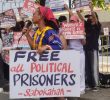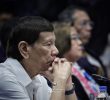TAGUM CITY—Media practitioners in Cagayan de Oro will boycott the first presidential debate slated at the city’s Capitol University on February 21.
This comes after a new guideline issued by the organizers from Manila limit the number of local press who will cover the debate, a case which the media group claims “a clear case of discrimination towards the province-based media.”
In a statement on Sunday, February 14, the Cagayan de Oro Press Club, Inc. said they are “indignant” with the issuance of the new guideline which is limiting the participation of the local press. The media group also pleads the Manila-based organizers to reconsider their earlier decision.
Discrimination
“This early, there have been suggestions for a Cagayan de Oro media boycott of the debate but we still trust that, in the end, reason will prevail, and that the organizers would reconsider their position and right this wrong. Stop this discriminatory and condescending attitude towards the local press community,” said Elmer Abacahin, Cagayan de Oro Press Club president.
According to the media group, Manila-based organizers—Kapisanan ng mga Brodkaster ng Pilipinas (KBP), GMA 7 and Philippine Daily Inquirer—have only allotted for Cagayan de Oro-based journalists, five slots for local editors/publishers as debate audience and five slots for newspaper reporters.
The media group also said “five newspaper reporters will only be allowed access to the event’s media center–a separate venue where a video monitor will broadcast feeds of the debate,” citing a letter sent by the organizers to the Philippine Press Institute (PPI).
“We see this to be a clear case of discrimination towards the province-based media. There have been many instances in the past when Manila-based media organizations have condescended on the provincial press,” Abacahin stressed.
Insult to local press
Abacahin said that limiting the number of local press to cover the presidential debate is a direct “affront to the local press community.”
“It is our position that the Presidential debate is far too important, and should be beyond corporate media’s quest for higher ratings and wider readership,” he said. “Why hold the debates here in the first place when the organizers can just as easily broadcast the debate from their studios in Manila?”
Moreover, he slammed the Manila-based media entities’ attempt to monopolize the presidential debate through “exclusivity clause.” By saying that the debate is imbued with public interest, Abacahin urged corporate organizers to lift such clause.
“The people’s right to know must weigh far heavier than any media entity’s ‘exclusive rights’ to an event that is clearly of national interest. We are talking about the next possible President of the Republic. We are all stakeholders. We ask that Manila-based organizers lift this ‘exclusivity clause’ in the coverage of the presidential debate to be held in our city.”
KBP explains: space limited
Meanwhile, PPI Executive Director Ariel Sebellino posted on Facebook an excerpt e-mail from Rey Hulog, the executive director of the Association of Broadcasters in the Philippines or KBP, explaining the decision of the organizers to limit the numbers of local press.
“Hi Ariel, I was just informed that the media center can accommodate as many as 200 persons. So we’re just asking those organizations who want to cover to submit their names by email with the names of their outfit and their designations. Thanks,” Hulog’s message to Sebellino reads as posted via Facebook on Monday, February 15.
Contributing to the event’s space limit is its TV studio set-up, Sebellino further explained. “The audience in the debate venue is very limited. From what I understand, other non-media in the debate studio are also limited. Anyway, KBP and CDO press club will be coordinating with each other.”
The February 21 presidential debate which will be held at the Capitol University is the first in a series of debates organized by the Commission on Elections in partnership with GMA 7, Philippine Daily Inquirer, CNN Philippines, ABS-CBN, Business Mirror, The Philippine Star, and TV 5. (davaotoday.com)










